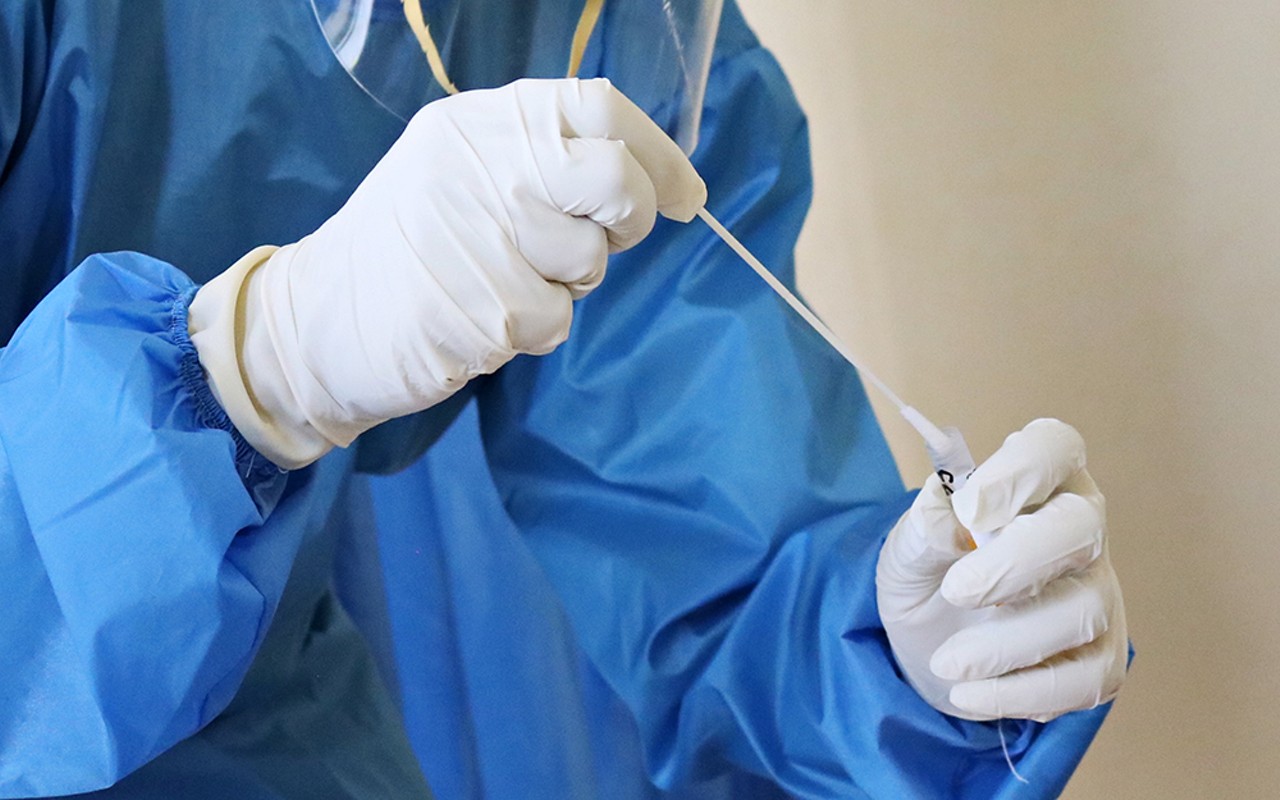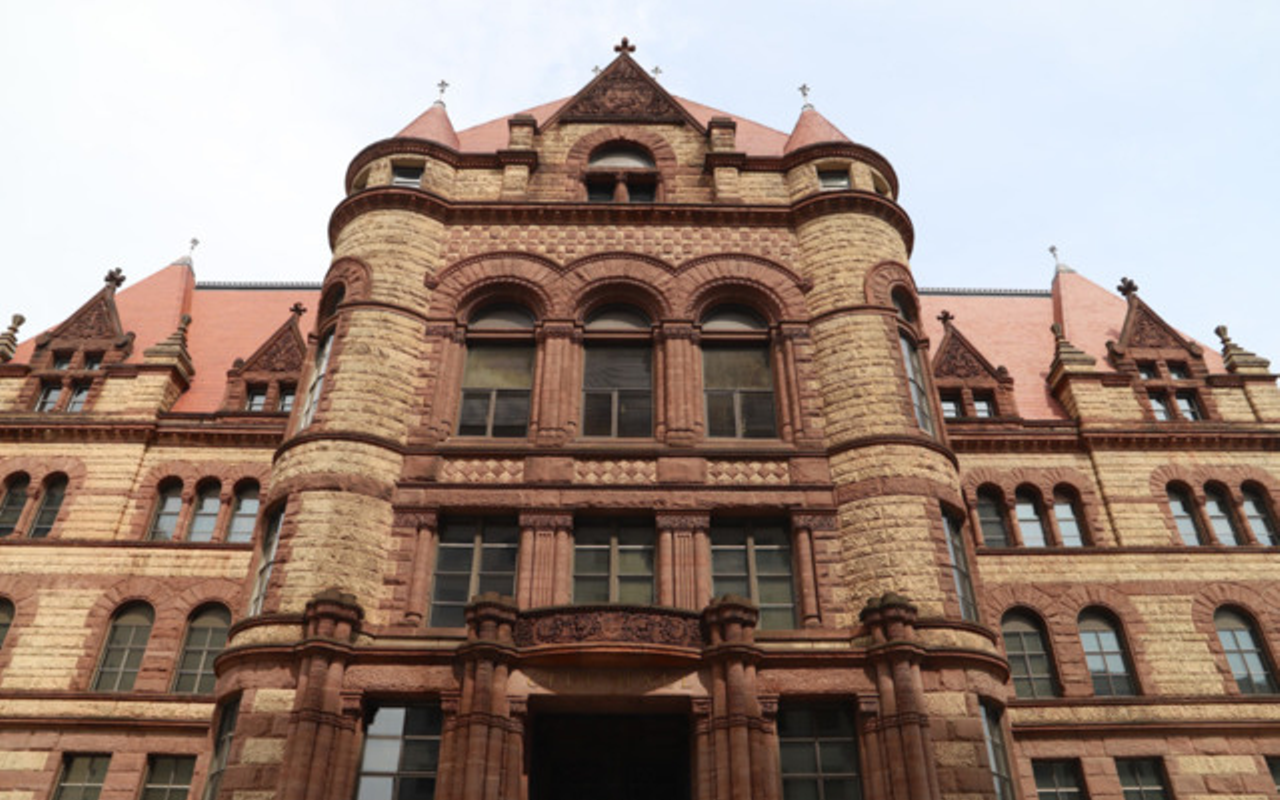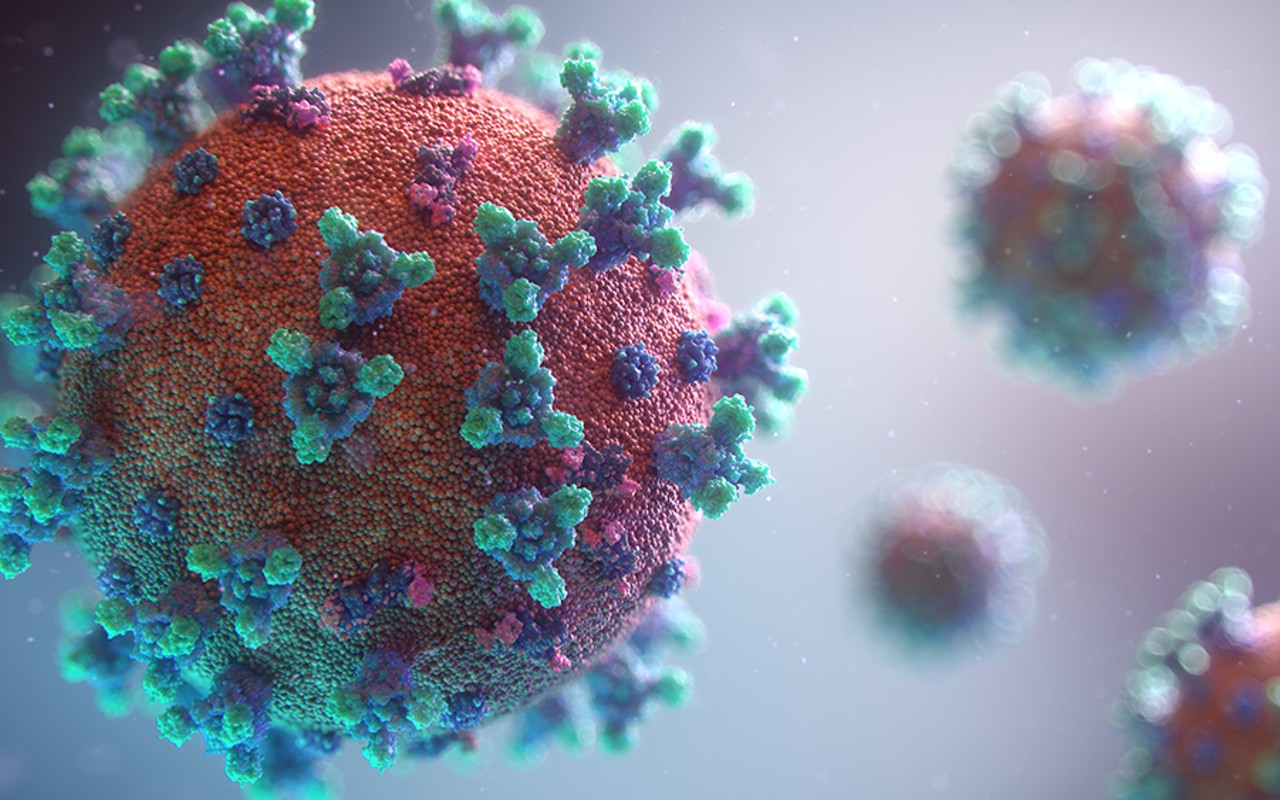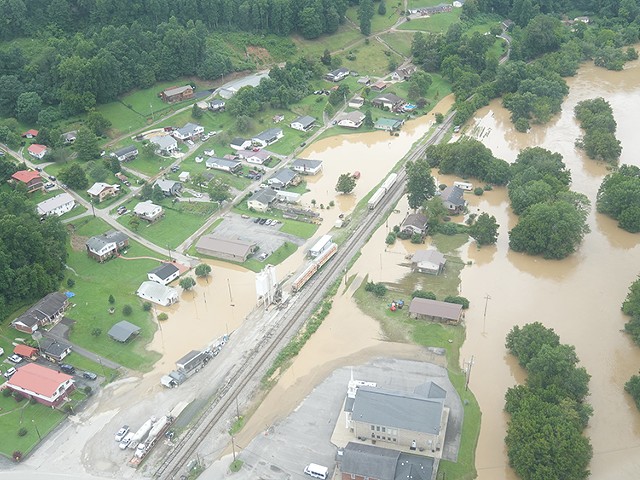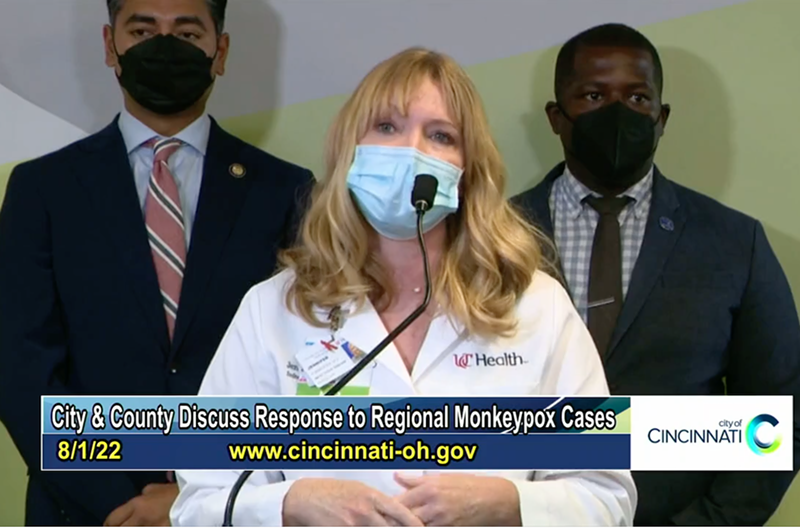
Photo: facebook.com/cityofcincy
Jennifer Forrester, an infectious diseases specialist at UC Health, addresses the monkeypox outbreak with Cincinnati mayor Aftab Pureval and Cincinnati City Council member Reggie Harris in the background on Aug. 1, 2022.
Monkeypox has made its way to Cincinnati, and now local health officials are asking residents to take precautions.
During an Aug. 1 media briefing, a group of regional health experts gathered with Cincinnati mayor Aftab Pureval to share what individuals can do to identify monkeypox, where to seek treatment and how to slow the spread of the outbreak. Officials say that the city of Cincinnati, Hamilton County, the multi-county Health Collaborative and area hospitals are working together to keep this new disease at bay while simultaneously dealing with the ongoing COVID-19 pandemic.
"Monkeypox does require a public health response that works very closely with providers for the healthcare delivery response and for evaluation of folks who may be at risk for having it or may have the symptoms," says Dr. Grant Mussmann, interim health commissioner for Cincinnati.
Hamilton County commissioner Denise Driehaus notes that jointly responding to the COVID-19 pandemic since early 2020 has better equipped the region for prevention techniques and solutions that can apply to the monkeypox outbreak and other health crises.
"Before that, we did not have this kind of automatic collaboration, but we have a system now that we can stand up because we've been through this before," Driehaus says. "This is like drill number two."
Pureval says that the region is looking ahead to dealing with monkeypox while COVID-19 cases continue to rise in Greater Cincinnati. The city recently resumed recommending wearing masks indoors and holding virtual meetings to slow the spread of the coronavirus. All officials were masked during the media briefing.
What is monkeypox?
Monkeypox is a rare disease that's part of the smallpox family. Patients typically have a 'prodrome' before the full onset of symptoms, says Dr. Jennifer Forrester, an infectious diseases specialist at UC Health."This is where people feel kind of cruddy, they feel like they have the flu, they have a headache, they might have a fever, they might have body aches. And then typically, that's followed by a rash a couple of days later," Forrester says.
The rashes – or lesions – are "poxy" and often form little bubbles, blisters or pimples on the skin, Forrester says. She notes that symptoms can vary from patient to patient, with some people avoiding prodrome and just immediately developing the rash.
"That's why it's important if you even suspect that you had a contact or suspect that your rash may be related to monkeypox that you see your healthcare provider," she says.
How does monkeypox spread?
"Monkeypox is spread through close, intimate, skin-to-skin contact with someone who has monkeypox. So the chances of you just going into the community today and getting monkeypox remain extremely low," says Greg Kesterman, Hamilton County health commissioner.As an intimate activity with lots of direct skin-to-skin contact, sexual activity can transmit monkeypox from one person to another, but this isn't a sexually transmitted disease. Monkeypox also is spread through kissing, by rubbing against open lesions or certain types of scabs and even by linens that have absorbed fluid from lesions.
"Although certainly, sexual contact is a close intimate contact, it is not the only way that this virus is spread," Forrester says.
In the United States, many of the monkeypox cases thus far have been seen in men who have had sex with men, leading some media members and non-scientists to stigmatize those individuals similar to the way gay men were stigmatized and discriminated against here during the AIDS/HIV epidemic of the 1980s and 1990s.
"As a member of the LGBTQIA+ community, I feel this deeply because many folks in my community are afraid of contracting the monkeypox virus or maybe even contracted it," Reggie Harris, Cincinnati City Council member, says. "And we feel little echos of a time before when we think about other illnesses that may have had a more specific population."
"We have a new disease that's spreading in a different manner but in ways that we've seen before – not just with COVID, but... the early AIDS epidemic," Mussmann adds. "We have different stigmas and different hesitations to get through in terms of contact tracing or in terms of identifying risk exposures. I think there's lots of lessons to be learned from all of those things."
Harris says that while monkeypox affects people of all sexual orientations, it's important to share scientific information that anyone – including people within the LGBTQIA+ community – can take action on.
"I appreciate the effort that is being taken by the CDC [Centers for Disease Control and Prevention] and local health departments to destigmatize the monkeypox virus and ensure that discrimination isn't endured by those that may have it. However, I do want to make sure that we are very clear in our messaging in that although anyone can contract the monkeypox virus, most cases are among men who have sex with men, which is why we must target our education and our messaging to those individuals and the LGBTQIA+ community," Harris says. "It's a delicate situation, and it must be handled with care."
Forrester says that though condom usage was urged in the 1990s – and still today – to curb the spread of AIDS/HIV, those aren't necessarily the right tools for monkeypox because it's not a sexually transmitted disease.
"I recommend safe sex for a lot of reasons, for the spread of a lot of other diseases, and condom use can help. But it is not the only way that should be used to prevent the spread," Forrester says. "It really is just skin-to-skin contact, not necessarily body fluids, which is what condoms may help protect against."
Forrester says that scientists don't believe monkeypox spreads through respiratory drops the way the coronavirus does. "There is potentially droplet spread with monkeypox, but that is not well studied and not what we think the main way [is] that monkeypox gets from person to person," she says. "It's not just, 'I'm not going to shake hands' or whatever. But the other thing we hope we've learned through COVID and ways people can protect themselves – I'll say it again – is wash your hands, wash your hands, wash your hands."
What should you do if you have monkeypox or have been exposed?
Forrester, Mussmann and Harris all say that knowing how your body looks and feels each day is key to identifying monkeypox and getting treatment."What's important about this is awareness of one's body, recognizing and being in touch, looking for symptoms in skin, and then isolating and being proactive about seeking treatment," Harris says. "This is absolutely something that we have control over because we can make very clear short-term decisions about our body and our contact with people."
Mussman and Forrester say that those who suspect they've been exposed to monkeypox or who think they have the virus should visit a healthcare provider for tests.
"The symptoms can be a bit nonspecific. You can get the 'I feel bad' prodrome and then you get the rash, which is why it's important to have the provider involved and also to make sure that there aren't other diseases that need to be tested for or evaluated for," Mussmann says.
"To date, there have not been many deaths, so it's not a particularly serious disease for most people," Forrester adds. "But the rash can be pretty extensive, actually, and can be pretty disturbing for people, as you can imagine."
Is a monkeypox vaccine available in Cincinnati?
If a healthcare provider confirms that a patient has monkeypox, they'll obtain the monkeypox vaccine from local, state or national health officials, Mussman says. The vaccine supply is limited as of this time and is being allocated by the CDC based on a risk calculation."The strategy with vaccination right now is to get vaccine into the arms of folks who are recently exposed or who are early in their symptom course. And the rationale there is even if you're early in your symptom course and you have monkeypox, you can actually decrease the duration of having the active lesions, which will decrease the likelihood of spreading," Mussmann says. "And then, of course, vaccinating the people who have been exposed, if you can vaccinate them early, again, you can decrease the likelihood of spreading."
Kesterman says that local health organizations will go through a process to obtain the vaccine, much like the way they did before the COVID vaccine was readily available.
"The public health response will continue just like COVID with a lot of information, making sure the public has access to information, making sure we're working with our partners to clear the vaccine – there's a process to getting the vaccine to our healthcare providers – and then managing vaccination for un- and under-vaccinated or underinsured Medicaid patients," Kesterman says, adding that Hamilton County and other health teams also deploy contact tracing.
A patient who has monkeypox should isolate while showing symptoms, the CDC says. Regular activities can resume once all lesions have healed, scabbed over and are forming new skin, Forrester adds. People who have been exposed to monkeypox but who have not yet contracted it should quarantine and watch for symptoms.
"Most symptoms will show up one to two weeks after exposure, but it could be as long as 21 days or even a bit longer," Forrester says. "Look at your risk factors and maybe try to pull those back."
How many local cases of monkeypox are there?
Kesterman says that there have been only two monkeypox cases identified in Hamilton County so far and just 23 throughout Ohio. "We are not seeing the spread that we are seeing in other communities, but now is the time to do that kind of groundbreaking work and get things together," he says.Harris emphasizes that the region is being proactive.
"This is not to incite any sort of hysteria. We have the tools as a community to manage this," Harris says. "All we're saying is this is a moment where we need to put that at the forefront. We remember when we had chickenpox and you would look at your children and say, 'Oh, that looks strange. Let me check this out,' and you would take precautions. It's the same thing except a little more targeted and has a little bit more of an acute reaction."
Information about monkeypox is available on websites for the health departments of Cincinnati and Hamilton County.
Stay connected with CityBeat. Subscribe to our newsletters, and follow us on Facebook, Instagram, Twitter, Google News, Apple News and Reddit.
Send CityBeat a news or story tip or submit a calendar event.

